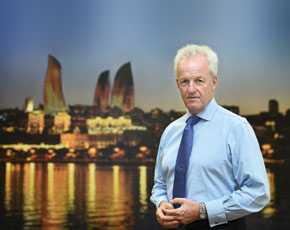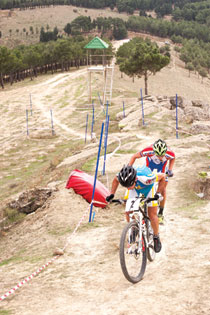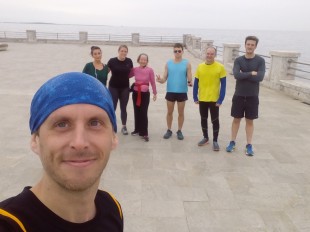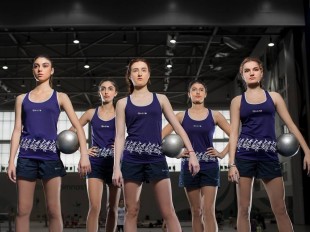Baku is getting into gear for the largest international event it has ever hosted – the inaugural European Games in June 2015. Venues are being completed and test events held to ensure that all runs smoothly when Europe’s top athletes descend on the city. Masterminding the organisational work is an Englishman, Simon Clegg, who has a wealth of experience in sports management. He talks to Visions’ Anne Thompson-Ahmadova about preparing for the historic Games.
What are the biggest challenges in organising Baku 2015?
Time, undoubtedly, presents the biggest challenge, no matter how much money or oil is out there in the Caspian. This project needs to be delivered in just 30 months, instead of the seven years’ preparation usually required for an Olympic games. That’s 30 per cent of the time frame that you would normally have. Now, this is not an Olympic Games but it is still a significant global multi-sport event: 6,000 athletes, compared with 10,000 in the Olympics, 20 sports compared with 28 sports in the Olympics, 17 days of competition, 3,000 officials as opposed to 5,000 officials. To deliver that in just 30 months would be challenging in any country; perhaps it’s particularly challenging here in Azerbaijan because of the lack of experience of delivering major international sports events in the past. The lack of management experience connected to this presents another huge challenge.
ON COURSE FOR A STUNNING EVENT
Would you say things are progressing on schedule?
Yes, recognising that everything is compressed. As I said to international colleagues when they reviewed our progress last month: Please don’t judge us on where you would normally expect an Olympic organising committee to be – then it was 260 days out from the opening ceremony – because we haven’t had the benefit of six years leading up to this moment in time. Everything is later than expected in an Olympic cycle, but at this moment I’m very confident that we’re going to deliver a stunning event. But there is still a huge amount of work to be done over the next 240 days.
What’s the biggest organisational task still to be done?
Elements of the organisation are still very heavily in the planning phases. We’ll have a massive task in bringing everything together, of moving from planning phases into operational, particularly when people deploy to the venues. We’ve got 943 full time members of staff in the organisation at the moment, 63 per cent of those are Azerbaijani, 37 per cent are from the expat community, made up of people from 39 different nationalities so we’re truly a global team. As we take more people on board, we’ll grow those 943 up to about 1,600, between now and 1 May.
It’s a massive operation, then.
It’s a big operation: 1,600 full time members of staff supported by 12,500 volunteers, television coverage going live or on a recorded basis into every continent in the world, so it’s a big responsibility to deliver this project in a way that properly reflects Azerbaijan as a forward-thinking, dynamic but young nation.
It was always going to be a challenge because it is the first Games. There is no history out there, so it’s challenging for us because there’s no file you can take off the shelf and see how they did it last time, because nothing exists. Whilst that is quite frightening in some respects, it’s also very exciting because you’re not constrained by history. It’s an incredibly exciting project and it’s moving at a hell of a pace.
What do you think are the biggest advantages Azerbaijan has as the host nation?
Well, any country whose resources happen to be liquid gold and natural gas is very, very wealthy. Azerbaijan is in a fortunate position of having the financial resources to do what it needs to do to deliver a successful Games. There aren’t many countries in Europe as blessed, that could afford to assemble such an outstanding team of executives that I’m privileged to lead here.
ATHLETES TO LEAVE HAPPY
What would a successful Games look like from your point of view?
Firstly, you have to look at it from the athletes’ point of view. I would want the participating athletes to leave incredibly happy that this was a well-organised event, delivered at a seriously high level, and that they felt that it was a worthwhile investment of their time, effort and energy to come here. It is a big unknown. We’re creating sporting history in Europe by staging this first event. Whenever you go to something new, you are slightly apprehensive, you don’t know what it’s about, so I want athletes leaving with an incredibly warm feeling about the event and of course about Azerbaijan and the hospitality they will receive here, of that I have no doubt.
If the athletes leave impressed and excited about their experience, there will be a real future for the European Games. If athletes want to come to the Games, then it will continue to attract the best athletes going forward; if the best athletes attend the Games, the broadcasters will want to broadcast the Games; if the broadcasters want to broadcast the Games, then immediately commercial sponsors are interested in providing financial resources. So athletes leaving, going ‘Yes, this was a really good event, top class event, I’m incredibly proud to call myself the first ever European champion’, would bode well for the Games.
This is important not only for the European Olympic Committees, but also for Azerbaijan. If Azerbaijan spends all of its money on the first European Games and there’s not a second one, then whatever we have achieved with Azerbaijan as the host country would not leave a particularly sweet taste in the mouth.
Of course, now that the European Games have fought their way into the crowded sports calendar, it would be great if we could create a unique selling point to stand up alongside the other continental games – the Pan-American Games and the Asian Games, which have been around since 1951; there’s even been an all-African Games and an Oceania Games since 1976 – that would be fantastic for the future.
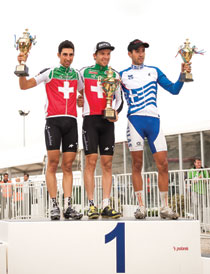 Men’s Cross-Country winner Martin Fanger of Switzerland, with second-placed Marc Stutzmann on the left of the picture and third-placed Dimitrios Antoniadis on the right
Men’s Cross-Country winner Martin Fanger of Switzerland, with second-placed Marc Stutzmann on the left of the picture and third-placed Dimitrios Antoniadis on the rightPROMOTING SPORT
Locally, we want to move sport up the social agenda. Sport already is very high on the political agenda, not least because President Ilham Aliyev was chairman of the National Olympic Committee even before he became president of the country. He understands sport, and what sport can do to achieve political objectives. In moving sport up the social agenda, this means that more people here, inspired by what they’ve seen here and experienced here, will want to take up and follow careers in sport.
The de facto benefit is that the more people participate in sport the healthier the nation becomes, with an increased life expectancy. It’s quite clever because if you extend the life expectancy of the nation, hopefully you reduce the costs on the health service here because everyone is fitter. So this brings it all the way round to another political objective.
I recognise that not everyone will want to take up triathlon and table tennis and badminton, but I’m hoping that some people will be inspired to volunteer in the future for major sporting events. I also want to create an appetite for buying tickets for major sporting events, not just the football and pop concerts which sell very well in this country at the moment.
It’s important to make the Azerbaijani population proud of what its country has delivered here for the sporting youth of Europe. So really, there are a number of objectives as to how, in my view, success might be measured, both internationally and domestically.
MASSIVE CRESCENDO
I think that now most people in Baku and Azerbaijan know about the Games, the Games has a presence. What can be done to promote the Games more widely in Europe?
Well, I’m pleased at what you say about Baku and Azerbaijan. We’ll be building this to a massive crescendo as we head towards the opening ceremony on 12 June. There is already a lot taking place around Europe which people inside Azerbaijan may not be aware of. For example, we’ve recently sponsored the Cannes firework festival, which the first lady attended, but people probably are not aware of the publicity that is now being generated. Every week I get a press cutting service, and I can tell you that last week alone we generated coverage in 302 publications across the whole of Europe, online, in print, on TV and in the media.
We had 38 countries here for a press seminar with journalists, who have now returned to their individual countries and are helping us promote the Games.
And we have recently announced broadcasting coverage that will take place in Hungary, Romania and Belgium. The first country we announced was Turkey; this week we’ve announced Germany, Austria and Switzerland. We are close to finalising deals in just about every major country inside Europe, and have commitment from every continent around the world. This demonstrates that there is incredible interest in the First European Games, not only in Europe, but across the entire globe.
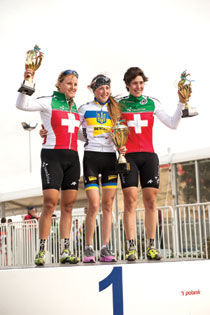 Women’s Cross-Country winner Iana Belomoina of Ukraine, with second-placed Kathrin Stirnemann on the left of the picture and third-placed Linda Indegrand on the right
Women’s Cross-Country winner Iana Belomoina of Ukraine, with second-placed Kathrin Stirnemann on the left of the picture and third-placed Linda Indegrand on the rightYou have extensive experience in sport – how is that helping you in your current role, and what is different about Baku 2015?
The majority of my experience has been on the other side, in being an end user if you like. I’m lucky enough to have led the British team, either as head or deputy head, at 12 Olympic and Olympic Winter Games, from 1988 to 2008. I was heavily involved in the initial conception of the London bid and selling it to the mayor of London and the British government. Then after Beijing I stepped aside and went off and ran a football club in my country for four years. I have been chief executive of an organising committee before, the European Youth Olympic Festival, but it was a much smaller event.
I suppose because I’m the white-haired senior representative here who still wears a tie because I’m that old-fashioned, I’ve been around the block a few times, and that allows me to utilise the experience that I’ve had over the best part of 30 years in the Olympic movement to face the slightly new and different challenges that have been presented to me here, particularly in terms of scale, than perhaps I may have faced previously.
What calibre of athletes do you expect to come to the Games?
We are fully confident that Europe’s best athletes will come to Baku 2015 and compete to make history as the first ever European Games champion in their sport. It’s important to remember that of the 20 sports on the programme at the Games next summer, a total of 11 will offer qualification opportunities for the Rio 2016 Olympic Games. I expect this to be a huge incentive for the athletes competing in these particular sports and we have worked very hard with a number of international sporting federations to guarantee these opportunities.
HUGE PRIVILEGE
What do you enjoy most about your job?
Just leading a fantastic team. This is a great team, it’s an incredibly strong team. It’s a very rich mixture of experienced expats and young, dynamic, hungry-to-learn Azeris. It’s a huge privilege for me to have been entrusted with this project, which is of such national importance to the country, to the president of the country, to the first lady, to the minister of youth and sport who of course is my boss as the chief executive of the organising committee, and to play a pivotal role in being responsible for delivering that, for creating sporting history in Europe. It will be the crowning moment of my entire career.
POACHER TURNED GAMEKEEPER
When did you first come to Azerbaijan?
I first arrived in August last year and for nine months I worked for the European Olympic Committees. I was effectively here one week every month from August until April where I was coming in to review the progress of the organising committee, trying to make sure I kept them on the straight and narrow and beating them over the head a little bit here and there where I felt it was necessary. Now I’m a real poacher turned gamekeeper. Now I’m on this side of the fence, leading this amazing team and trying to stop people from beating me on the head with a stick. I’ve been here full time since May.
Have you had the chance to travel in Azerbaijan very much?
Do you know, that’s one of the things that I’m really disappointed about so far. I’ve not had a chance to really go outside the city. I’ve gone up to Bilgah beach, but not much further than that. I’m really looking forward to trying out the two ski slopes this winter, having previously been with one of the national ski teams in the mid-80s. Skiing is one of my sports. I need to get up to Mingachevir as well, because that’s where the canoe flat water events are taking place.
CANNES OF THE CASPIAN
I don’t expect you have much free time, but when you do, what are the places in Baku that you like to visit? What are your impressions of the city?
I like walking around the Old City. I think it’s absolutely beautiful, you can smell all the history there and just take it all in. And I love walking down the Boulevard. I’ve referred to Baku as the Cannes of the Caspian; I think it’s absolutely stunning. And to be honest, I also enjoy having a glass of wine on the 19th floor of the Fairmont Hotel, looking down over the whole of Baku. I think it’s one of the best views in the entire city.
